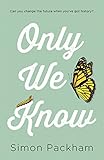
Price: £12.99
Publisher: Piccadilly Press
Genre: Fiction
Age Range: 10-14 Middle/Secondary
Length: 240pp
Buy the Book
Only We Know
‘Katherine approaches the art block like a vegetarian on a school outing to the abattoir.’ This kind of observation is characteristic of Year 11 narrator Lauren, whose agile language consistently enlivens the mundane world of home and school. Not too many real-life Year 11s could sustain such a comic stance and if Simon Packham were pretending to any kind of YA gritty realism, credulity might well be stretched. But he’s not – and Lauren’s voice is one which many readers will much enjoy. This is all the more remarkable since at the novel’s core is the experience of gender transition, an area where you might think humour could easily be misjudged; risky territory where maybe only a stand-up comedian – as Mr Packham was in an earlier incarnation – might dare to tread.
Lauren has transferred to a dull new school in a dull new town. She and her family – Mum, Dad, and Year 10 sister Tilda – have just moved there; reluctantly, it seems, and solely prompted by something Lauren has done. Exactly what that is may not be spelled out until the closing chapters, but regular clues are planted. Readers might well feel that Mr Packham is being a little arch, not to say manipulative, in playing this game; but then he does need to defer the revelation for the climax of his novel to work as well as it certainly does.
That apart, readers should be swept along by the pace and wit of the telling. To start with, all goes surprisingly well for the anxious Lauren at St Thomas’s Community College where, as in most fictional schools, the important stuff is rarely interrupted by actual lessons. The teachers are concerned to help her settle in, they are informal and often funny about themselves, especially the few who are aware of her secret past. Lauren is allocated the highly articulate and literary, not to say geeky, Katherine as a minder (in another novel, you might query her credibility too); but she makes other friends readily and soon finds herself helping to plan a fashion show in which teachers positively grab the chance to risk looking foolish as models. She even begins a friendship with the attractive Harry, deputy head student, though she knows – but does he? – they’ve met in that earlier life. Harry is considerate and gentle, steering Lauren safely through her first party, an almost obligatory set piece in teen fiction. Then things fall apart. Someone is leaving ‘presents’ for her – a Paddington Bear with a knife stuck in his back, a Woody from Toy Story left hanging by his neck in a subway she’s likely to pass through on her way home one night with, on one foot, her initials, and on the other, R.I.P. These objects hold memories for her – so someone knows her past. The persecution which almost broke her at the last school begins all over again. Lauren has shown a kind of moody impulsiveness before – we’ve seen her give her grandmother, who had refused to see her for many months, a ferocious verbal working over. Now she jumps from one false accusation to another, attacking the very people who have been supportive of her. It may be this erratic side, balanced by her courage, humour and self-criticism, which makes her a character readers will care about.
The truth inevitably emerges – spectacularly so, just as Lauren takes to the catwalk in her little yellow beach dress. The show collapses into catastrophe, but as Lauren’s secret and her betrayer are dramatically revealed, the responses of her fellow pupils and her teachers are genuinely moving; somehow optimistic rather than sentimental. To blend empathy and comedy in writing about an area that remains beyond the direct experience of most is something of a tour de force.



